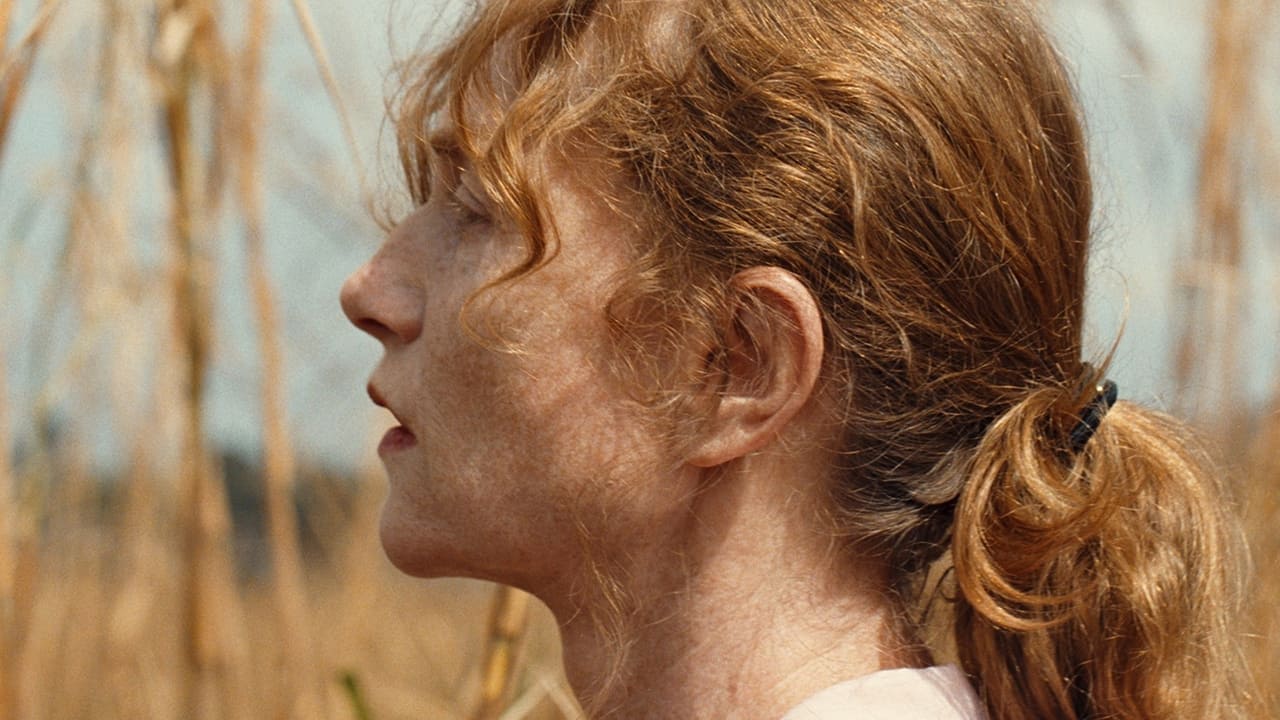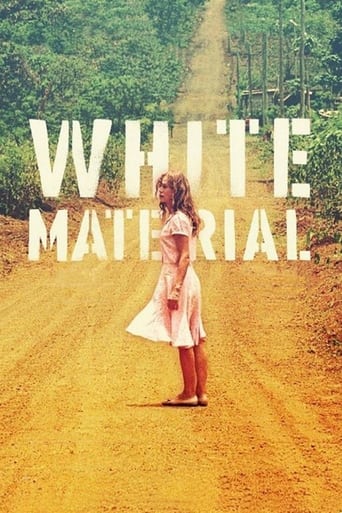

How does a country descend into civil war, and from there, to genocidal slaughter? Some of the most terrible stories of recent years come from Africa (poverty being one obvious driver) and this film, like the more famous 'Hotel Rwanda', is set in such terrain. I personally found the latter film unsatisfactory, as it told a story of basically good people attacked, in effect, by mindless zombies: 'White Material' is better at giving a portrait of life in a society where the pillars of order are crumbling, and thereby offers a more convincing narrative as to how the bonds of normal human decency might break. It also offers an interesting perspective by looking at events from the viewpoint of white farmers: not evil per se (although the film doesn't make them particularly sympathetic), but owning too many resources in a land that sees that claim to title as rooted in the colonial past. What doesn't work, for me, is the particular plot: while the mood of the characters, and of their world, is well created, the details of the situation remain unclear: who does what to who, and why, remains frustratingly enigmatic. Isabelle Huppert is good in the lead role; but the absence of a black African in a role of matching prominence is arguably a weakness, the murder goes on and the explanation is never quite forthcoming. Perhaps that's asking too much of a mere movie: if the explanation was obvious, the world would not have to endure so much pointless suffering.
... View MoreThe setting for the film is a West African, French-speaking country riven by civil unrest and fighting between the army and rebels who consist of children, many orphaned. The rebels' icon and unofficial leader is a former soldier known as The Boxer (a cameo from Isaach de Bankole). Directed by Clare Denis she presents the country's unravelling situation and uses a non-linear narrative to loop back and forth within the 48-hour period that is the story's time frame.Amidst the mayhem we are slowly introduced to the owners of a coffee plantation, who are a white family of French origins: Maria Vial (Huppert), her ex-husband Andre (Lambert), their son Manuel and his grandfather Bernard. Living with the family is Andre's second wife/partner Lucie and their son Jose. At the point we meet the family they are 5 days from coffee harvest and their workers are fleeing the plantation afraid for their lives. They leave to return home because 'coffee is just coffee and not worth dying for'. Maria does not feel the same way and recruits some replacement workers to ensure a successful harvest. Meanwhile Andre, who shares the workers' fears, is plotting the family's escape which means selling the plantation to the local mayor who will ensure their safe passage out of the country. This is kept from Maria who has vowed never to leave.As events unfold it is obvious to everyone around Maria that the situation is becoming less stable and increasingly precarious. She refuses to see or acknowledge this. Interspersed throughout we hear a DJ allied to the rebels, used as a sort of narrator, playing reggae and making pronouncements against the existing government and white people, who are the 'white material' of the title.The film's narrative and characters make it difficult for the viewer to apprehend what is happening immediately and/or to like/relate to the characters easily. This is part of its success: the situation and people we are presented with are complex. Although of French origin and white we learn that Bernard and Manuel were both born in the country making them citizens. Maria has left France and never wants to return; she herself despises the white French people ('these dirty whites ... they don't deserve this beautiful land') and clearly does not perceive herself to be one even though the rebels and army see her as one such 'dirty white' who makes the country 'filthy'. Throughout is woven the theme of where is home and what it means to feel you belong and rooted in a situation where others label you an outsider. Maria is a tough fighter but lacks sensitivity and does not seem to realise, or wish to see, how she is perceived. We witness the tragic consequences of this to her, her family and the people who work with her as the film works to its conclusion.The film is beautifully shot with an atmospheric soundtrack provided by Tindersticks. The colours, the heat, the expanse are well evoked and make you realise why Maria loves it so she is prepared to risk her life and those close to her. There is spare use of dialogue and Huppert excels at the role of Maria, a difficult woman of few words. This is the sort of film that benefits from more than one watch as Denis packs in characters and events all of which add to the texture of the film and its politics.
... View MoreChaos reigns in some nameless, war-torn African nation. A murderous rag-tag guerrilla group searches the jungle wilderness for its charismatic wounded leader The Boxer, while some equally ruthless government soldiers try to hunt him down. As the signs of war multiply, The Boxer finds a hiding place in some deserted outbuildings at the Vial coffee plantation which has been abandoned by its workers. Fear surrounds the decaying French-owned estate where Maria Vial resides with her ex-husband Andre, their dissolute half-mad son and her hated father-in-law. Maria ignores warnings to leave and obsesses over the unharvested coffee crop, while Andre conspires with the sinister local mayor to hand over the property in exchange for safe passage out of the country.Director Denis makes no attempt to explore her characters, their relationships or the stories behind their present condition, apparently satisfied with documenting the surface symptoms of communal meltdown. She focuses on Maria, but reveals nothing about her heroine except for the foolish fixation on the neglected coffee beans. All the other characters possess similarly one-dimensional personalities - the Europeans are reduced to stereotypes of colonial decadence, while the Africans are portrayed as bloodthirsty and venal. When the film culminates in an orgy of capricious madness it's impossible to care about anyone's fate, because it's obvious they are symbols existing in a metaphor. Denis doesn't appear to care either.
... View MoreIn an unknown African country, a civil war is going on. This French woman refuses to escape. She wants to save the coffee.There's movie horror and there's real horror and this comes close to the later one. But it doesn't escalate, it's latent all the time, until the final eruption.What's more important is however what's on trial here. It's not colonialism or greed or prejudices. More than so, it's The White Mother, who is rebelled, not only by her son, but by being determined, by not giving up, by not fearing. The key line is when she says to her son: -"I will never let you go". Interesting.
... View More